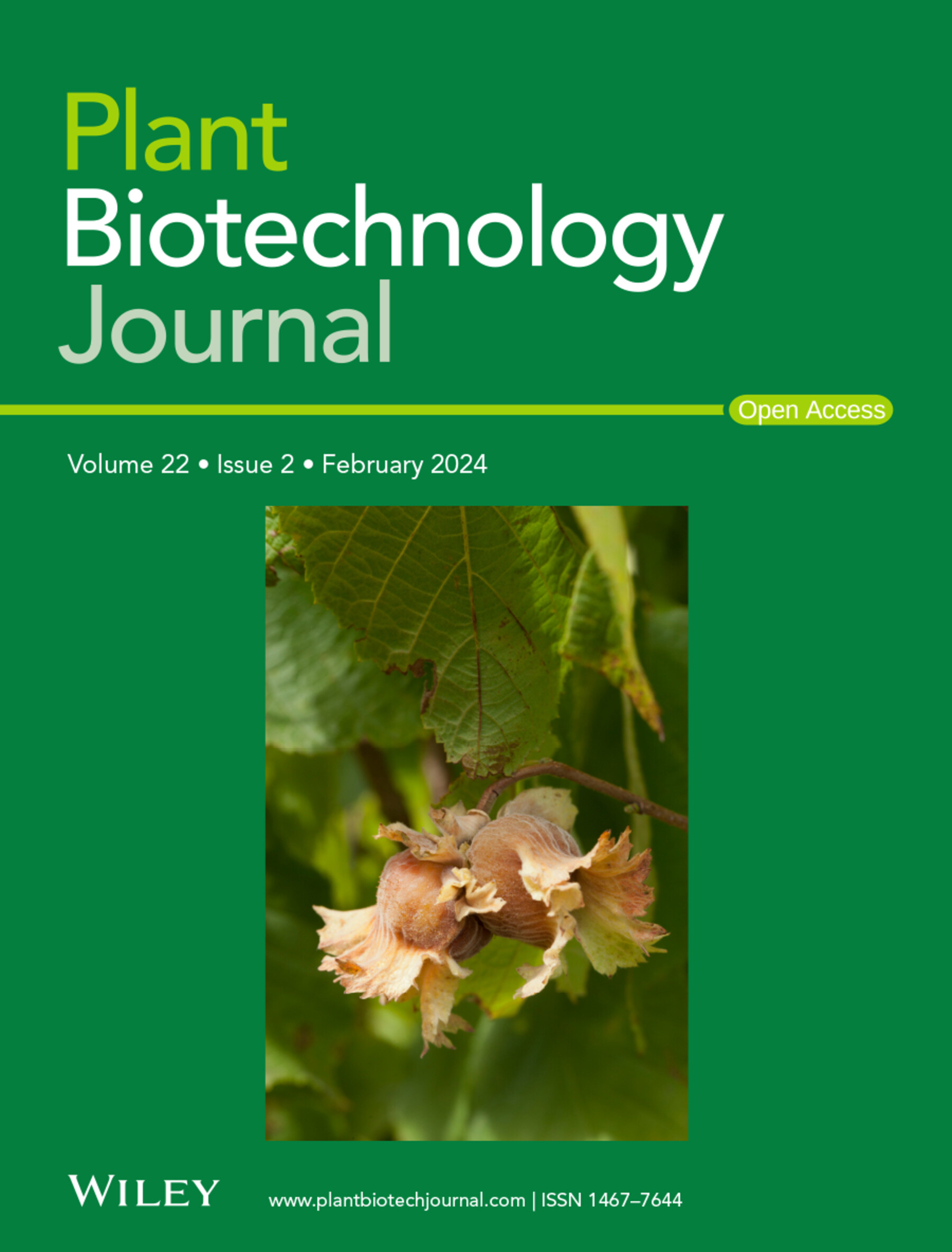以浮萍为基础的可食用疫苗通过诱导强大的粘膜和全身免疫,对禽传染性支气管炎病毒提供完全的保护。
IF 10.1
1区 生物学
Q1 BIOTECHNOLOGY & APPLIED MICROBIOLOGY
引用次数: 0
摘要
利用可食用植物的分子农业为疫苗生产提供了一种具有成本效益的策略,因为植物既可以作为生物反应器,又可以作为口服给药系统。由于浮萍克隆繁殖快,蛋白质含量高,是一个很有前途的平台。在这里,我们开发了一种以鸭浮萍为基础的可食用疫苗,靶向禽传染性支气管炎病毒(IBV),这是一种家禽高度传染性呼吸道病原体,并直接将其与市售的H120减毒活疫苗的效力进行了比较。将表达IBV抗原肽EpiC的转基因浮萍口服给鸡,进行免疫评价和病毒攻毒。在没有佐剂的情况下,EpiC浮浮草疫苗引发了强大的全身IgG和粘膜sIgA反应,对致命的IBV攻击具有100%的保护作用,这与H120疫苗的效力相当或超过了H120疫苗。引人注目的是,与表达IL-17B的浮萍作为佐剂共同给药可协同增强免疫反应,包括血清中ibv特异性igg升高(P < 0.001),气管和肾脏中ibv特异性sIgAs升高(P < 0.05),以及气管病毒载量降低(P < 0.05)。转录组学分析显示b细胞受体的上调和IgA产生通路的富集,表明siga介导的粘膜免疫是一个关键的保护机制。组织病理学分析证实了对ibv诱导的组织损伤的保护,而在关键器官中降低病毒载量显示出全身功效。通过在头对头比较中优于一种已获许可的疫苗,这项工作突出了浮萍为现实世界的采用做好了准备,为家禽业及其他行业对抗粘膜相关感染提供了变革潜力。本文章由计算机程序翻译,如有差异,请以英文原文为准。
Duckweed-based edible vaccine confers complete protection against avian infectious bronchitis virus by inducing robust mucosal and systemic immunity.
Molecular farming using edible plants offers a cost-effective strategy for vaccine production because plants serve as both bioreactors and oral delivery systems. Owing to its rapid clonal propagation and high protein content, duckweed represents a promising platform for this purpose. Here, we developed an edible duckweed-based vaccine targeting avian infectious bronchitis virus (IBV), a highly contagious respiratory pathogen in poultry, and directly compared its efficacy to that of a commercial live-attenuated H120 vaccine. Transgenic duckweed expressing the IBV antigen peptide EpiC was orally administered to chickens, followed by immunological assessment and viral challenge. Without an adjuvant, the EpiC duckweed vaccine elicited robust systemic IgG and mucosal sIgA responses, conferring 100% protection against lethal IBV challenge - which is comparable to or exceeds the efficacy of the H120 vaccine. Strikingly, co-administration with duckweed expressing IL-17B as an adjuvant synergistically enhanced immune responses, including elevated IBV-specific IgGs in serum (P < 0.001), increased IBV-specific sIgAs in the trachea and kidney (P < 0.05), and reduced tracheal viral loads (P < 0.05). Transcriptomic analysis revealed the upregulation of B-cell receptors and enrichment of the IgA production pathway, indicating that sIgA-mediated mucosal immunity is a key protective mechanism. Histopathological analysis confirmed protection against IBV-induced tissue damage, whereas a reduced viral load in critical organs demonstrated systemic efficacy. By outperforming a licenced vaccine in head-to-head comparisons, this work highlights the readiness of duckweed for real-world adoption, offering transformative potential for combating mucosa-associated infections in the poultry industry and beyond.
求助全文
通过发布文献求助,成功后即可免费获取论文全文。
去求助
来源期刊

Plant Biotechnology Journal
生物-生物工程与应用微生物
CiteScore
20.50
自引率
2.90%
发文量
201
审稿时长
1 months
期刊介绍:
Plant Biotechnology Journal aspires to publish original research and insightful reviews of high impact, authored by prominent researchers in applied plant science. The journal places a special emphasis on molecular plant sciences and their practical applications through plant biotechnology. Our goal is to establish a platform for showcasing significant advances in the field, encompassing curiosity-driven studies with potential applications, strategic research in plant biotechnology, scientific analysis of crucial issues for the beneficial utilization of plant sciences, and assessments of the performance of plant biotechnology products in practical applications.
 求助内容:
求助内容: 应助结果提醒方式:
应助结果提醒方式:


